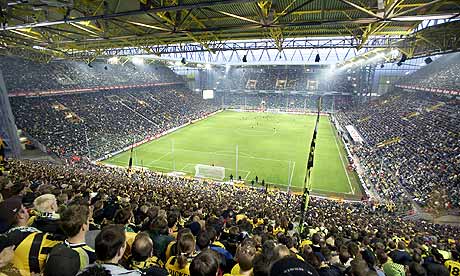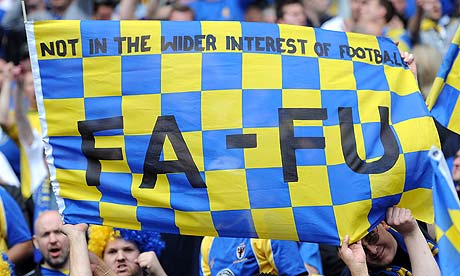Is the Prem really best league in the world? Yes, for bleeding fans dry
 BRIAN READE
BRIAN READE
17 Nov 2012 07:30
PLUS: Zlatan Ibrahimovic, Steven Gerrard, Manchester City's Satanic pact and more
 The great football swindle: are tickets now too expensive?
The great football swindle: are tickets now too expensive?
I’ll repeat that for those with lengthy match-going memories who don’t yet light cigars with £20 notes. The cheapest no-frills ticket that Arsenal had left for a home league game was a quid short of 90. Or what it would take an adult on the national minimum wage 14 hours to earn.
There was incredulity on the airwaves but not shock. Because it’s what we’ve all come to expect.
On Sunday, the cheapest ticket a mate could buy in the Chelsea away end was £56. It cost him £74 to travel from Liverpool by rail. For the same game in 1986 the train ticket cost £11.50 and entrance to Stamford Bridge £3. Meaning that in 26 years the cost of train travel (which we’re constantly told is scandalous) has gone up 6.5 times wheras the cost of watching top-flight football has gone up almost 18.5 times.
Indeed, in the past year alone, the cheapest Premier League ticket has risen from £24.87 to £28.30. A rise of 13.7%, almost six times the rate of inflation, during a double-dip recession when real wages are falling.
And no-one is really shocked because that is what we’ve come to expect. Besides where’s the Off-fan commissioner to complain to?
The clubs pay lip service to fans’ pleas, players are so obsessed with wangling their next big pay deal ticket prices are irrelevant, politicians have no will to act (remember The Football Task Force headed by that great People’s Tribune Lord David Mellor which had as much impact as a trump in a hurricane) and the Premier League don’t care so long as the billions keep pouring in from TV deals.
But how much longer can this immoral ripping-off of one set of consumers go on before people take a stand?
There was a very successful Un-Convention event at Manchester’s National Football Museum last weekend, attended by a couple of hundred fans from different clubs, whose main point of discussion was the scandalous ticket prices.
There was a flag at Stamford Bridge on Sunday which said “Football Is Nothing Without Fans.” It was a shot across the bows at those who think the exploitation of the paying public can continue ad infinitum.
It can’t. Grass roots fan groups, inspired by the Against Modern Football movement, are organising. They know that if English football wants to continue marketing itself as a unique global brand it needs them.
The Premier League is not technically the best in Europe, but it is deemed the most intense and passionate. That’s why it sells.
Yet our grounds are getting less and less atmospheric because the young, the lower-paid and traditional supporters are being driven out by tourists on day trips and the well-connected on business jollies.
If that’s what Premier League clubs want, then fine. Go ahead and pump the next £5billion you’ll receive from TV deals into the pockets of super-rich players and agents, while driving ticket prices ever more upward.
But beware. Germany is not only starting to produce better teams than us, it has long had more atmospheric grounds because instead of ripping people off it takes pride in fostering a passionate, old-fashioned fan culture.
Who’s to say in a few years the world won’t prefer to watch a raucous thriller between Bayern and Dortmund to a routine rout of Reading at the Etihad with rows of sky blue plastic on show?
One City fan at last week’s Manchester convention made a great point about Adrian Chiles and the ITV panel bemoaning the number of empty seats at the recent televised home game against Ajax:
“Sorry we couldn’t provide the ideal backdrop for your cameras, chaps. But when was the last time any of you smug, over-paid b******s paid to go to a match?”
It’s a point you’ll increasingly hear until football realises it can only drain so much from its life-blood until all that’s left is an anaemic shell.

17 Nov 2012 07:30
PLUS: Zlatan Ibrahimovic, Steven Gerrard, Manchester City's Satanic pact and more
Getty
I heard a radio discussion the other day about the lowest-priced general sale ticket for today’s north London derby coming in at £89.I’ll repeat that for those with lengthy match-going memories who don’t yet light cigars with £20 notes. The cheapest no-frills ticket that Arsenal had left for a home league game was a quid short of 90. Or what it would take an adult on the national minimum wage 14 hours to earn.
There was incredulity on the airwaves but not shock. Because it’s what we’ve all come to expect.
On Sunday, the cheapest ticket a mate could buy in the Chelsea away end was £56. It cost him £74 to travel from Liverpool by rail. For the same game in 1986 the train ticket cost £11.50 and entrance to Stamford Bridge £3. Meaning that in 26 years the cost of train travel (which we’re constantly told is scandalous) has gone up 6.5 times wheras the cost of watching top-flight football has gone up almost 18.5 times.
Indeed, in the past year alone, the cheapest Premier League ticket has risen from £24.87 to £28.30. A rise of 13.7%, almost six times the rate of inflation, during a double-dip recession when real wages are falling.
And no-one is really shocked because that is what we’ve come to expect. Besides where’s the Off-fan commissioner to complain to?
The clubs pay lip service to fans’ pleas, players are so obsessed with wangling their next big pay deal ticket prices are irrelevant, politicians have no will to act (remember The Football Task Force headed by that great People’s Tribune Lord David Mellor which had as much impact as a trump in a hurricane) and the Premier League don’t care so long as the billions keep pouring in from TV deals.
But how much longer can this immoral ripping-off of one set of consumers go on before people take a stand?
There was a very successful Un-Convention event at Manchester’s National Football Museum last weekend, attended by a couple of hundred fans from different clubs, whose main point of discussion was the scandalous ticket prices.
There was a flag at Stamford Bridge on Sunday which said “Football Is Nothing Without Fans.” It was a shot across the bows at those who think the exploitation of the paying public can continue ad infinitum.
It can’t. Grass roots fan groups, inspired by the Against Modern Football movement, are organising. They know that if English football wants to continue marketing itself as a unique global brand it needs them.
The Premier League is not technically the best in Europe, but it is deemed the most intense and passionate. That’s why it sells.
Yet our grounds are getting less and less atmospheric because the young, the lower-paid and traditional supporters are being driven out by tourists on day trips and the well-connected on business jollies.
If that’s what Premier League clubs want, then fine. Go ahead and pump the next £5billion you’ll receive from TV deals into the pockets of super-rich players and agents, while driving ticket prices ever more upward.
But beware. Germany is not only starting to produce better teams than us, it has long had more atmospheric grounds because instead of ripping people off it takes pride in fostering a passionate, old-fashioned fan culture.
Who’s to say in a few years the world won’t prefer to watch a raucous thriller between Bayern and Dortmund to a routine rout of Reading at the Etihad with rows of sky blue plastic on show?
One City fan at last week’s Manchester convention made a great point about Adrian Chiles and the ITV panel bemoaning the number of empty seats at the recent televised home game against Ajax:
“Sorry we couldn’t provide the ideal backdrop for your cameras, chaps. But when was the last time any of you smug, over-paid b******s paid to go to a match?”
It’s a point you’ll increasingly hear until football realises it can only drain so much from its life-blood until all that’s left is an anaemic shell.




